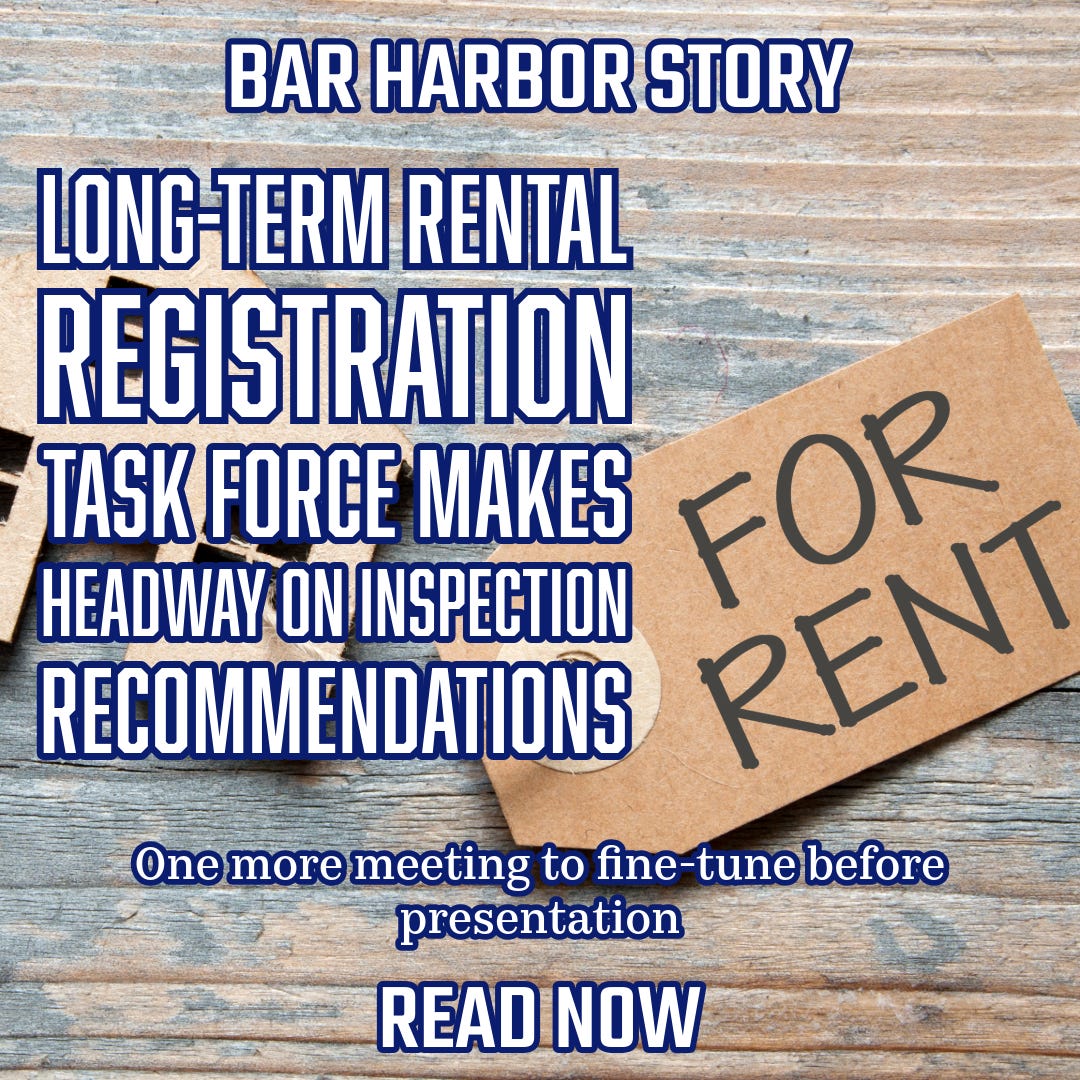Long-Term Rental Registration Task Force Makes Headway on Inspection Recommendations to Council
One more meeting to fine-tune before presentation
BAR HARBOR—After some fine-tuning and a little debate over wording, the Long-Term Rental Registration Task Force is one meeting away from making inspection recommendations to the Town Council for long-term rentals. A long-term rental is defined by the town municipal code as “any dwelling unit that is rented or available for rent for a period of 30 consecutive days or more, in exchange for compensation.”
Code Enforcement Officer Angela Chamberlain brought five preprepared possible recommendations to the group’s May 28 meeting so that members could consider whether to recommend or not recommend to the Town Council.
The group voted in all of the five prepared recommendations after some discussion and slight rewording. All but one were unanimous votes.
The first was that an inspection component should be added to the program to maintain the quality and adequacy of the long-term rental housing stock by ensuring that all rental units in the Town of Bar Harbor are maintained in a safe and sanitary condition and do not create a nuisance or derelict condition to the surroundings.
The next recommendation was for an inspection of all long-term rental units, which must be conducted on at least a three-year basis.
The third was that the long-term rental safety inspection will be limited to the following four areas:
The presence of operable smoke, carbon monoxide, and explosive gas detectors.
Safe and effective egress.
Adequate E911 addressing signage at the property.
Address immediate life safety issues.
A fourth recommendation was that inspections shall be prioritized using a weighted risk score model based on property characteristics. The higher the score, the greater the priority and placement on the inspection list will be organized by the score.
The fifth recommendation was that the inspection component of the program should be revisited after a three-year period to assess its adequacy in continuing to meet the goals of the program and for staff to recommend modifications.
That second recommendation for inspections created the most discussion.
Planning Director Michele Gagnon recommended the time frame not be specific but instead say, “regular basis.” Gagnon also suggested that rental units that were newer or passed inspection with flying colors could have less frequent inspections.
Chamberlain said that she would want to be careful about such an exemption for regularly scheduled inspections because “a lot of problems are tenant caused rather than landlord caused.”
Deputy Code Enforcement Officer Mike Gurtler suggested that it read, “at least every three years,” saying that based on his experience with inspecting short-term rentals, the long-term rental inspections should be a quick process and they can get through the 400 or so registered long-term rentals fairly easily over the three-year period by using a rotating inspection system that mirrors the short-term rental inspection cycle.
Gurtler went on to explain that having the inspections on a three-year cycle also allows regular inspection in case of tenant-caused issues that a landlord may not be aware of or other changes like the new ownership of a building.
“I just would rather say ‘on a regular basis as determined by the Code Enforcement Officer based on staffing’ and then let them pound this out if they are going to do it every two years, three years, or four years,” Gagnon said.
Gagnon then asked member John Mountford, who had previously made a motion, if he minded changing his motion so that it read, “on a regular basis.”
Fire Chief Matt Bartlett said, “Just so you know, I am not going to vote for that.”
Bartlett went on to say that he agrees with Gurtler and that it should be a consistent time frame so that people know that everyone is getting inspected on the same basis and there is no room to worry about one renter being inspected more than another.
There was concern about staffing for the inspections, but Gurtler explained that all of the short-term rentals have had their initial inspection now, so those recurring inspections will be easier. In addition, the short-term rentals are slowly decreasing and with the limited inspections that long-term rentals will have, they should be able to get them all done.
Bartlett added that he agrees and if the fire department needs to jump in and help out with inspections, they can and will to meet the three-year goal.
It will ultimately be up to the Town Council to decide who will be conducting the actual inspections.
This was the one vote that wasn’t unanimous with members Erica Brooks and Amber Howard dissenting.
Recommendation number three also garnered a good amount of discussion with the Task Force eventually recognizing Bartlett’s suggestions to add flammable gas detectors (a state-mandated requirement for rentals) to bullet point number one and adding a fourth bullet point that reads, “address immediate life safety issues” as a safety net in case of glaring violations that are not specifically covered by the first three bullet points and would lend themselves to a dwelling unit not being rentable due to life safety reasons.
The “weighted risk score model” in recommendation number four refers to the information gathered from a renter’s long-term registration form. Some of the information gathered on these forms indicates that units may not meet the very basic requirements, such as smoke or CO detectors, and these units will be among some of the first that get inspected.
INSPECTION EXEMPTIONS
According to Chamberlain, Chapter 130 of the town’s municipal code exempts the following from long-term rental registration requirements and therefore exempts them from an inspection requirement under Chapter 130 which is “Long-Term Rental Housing.”
“The provisions of this chapter do not apply to the YWCA Mount Desert Island, Short-Term Rentals, Employee Living Quarters, Shared Accommodations, any type of transient accommodation of less than 30 days, government regulated housing under HUD regulations, campgrounds, on-campus college dormitories, convalescent and/or congregate housing, and nursing homes; all as defined in Chapter 125 of the Bar Harbor Municipal Code,” it reads.
Any property that is registered as both a short-term rental and a long-term rental is automatically exempt from a long-term rental inspection because the short-term rental inspection is much more in depth and detailed.
The Long-Term Rental Registration Task Force will meet one more time in June and have a final discussion on the five recommendations that were voted in on May 28, before presenting them to the Town Council. That meeting date has not been set yet.
A QUICK NOTE FROM US
Our last article was significantly updated this morning and may be updated again. You can scroll to the end to find that information and new documents. That story, and all of our stories, are on our websites (here and here) if you ever want to go back and peruse them.
COME HANG OUT AND LISTEN TO THE CANDIDATES TONIGHT
We’ll be posting this on each of our stories today because it’s tonight and we want to make sure you know about it.
If you’d like to donate to help support us, you can, but no pressure! Just click here.







